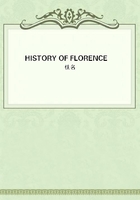
第34章
The first who set this disturbance on foot were the Medici and the Guinigi, who, with the legate, had discovered themselves in favor of the rebels; and thus skirmishes took place in many parts of the city.
In addition to these evils a fire occurred, which first broke out at the garden of St. Michael, in the houses of the Abati; it thence extended to those of the Capoinsacchi, and consumed them, with those of the Macci, Amieri, Toschi, Cipriani, Lamberti, Cavalcanti, and the whole of the New Market; from thence it spread to the gate of St.
Maria, and burned it to the ground; turning from the old bridge, it destroyed the houses of the Gherardini, Pulci, Amidei, and Lucardesi, and with these so many others that the number amounted to seventeen hundred. It was the opinion of many that this fire occurred by accident during the heat of the disturbances. Others affirm that it was begun willfully by Neri Abati, prior of St. Pietro Scarragio, a dissolute character, fond of mischief, who, seeing the people occupied with the combat, took the opportunity of committing a wicked act, for which the citizens, being thus employed, could offer no remedy. And to insure his success, he set fire to the house of his own brotherhood, where he had the best opportunity of doing it. This was in the year 1304, Florence being afflicted both with fire and the sword. Corso Donati alone remained unarmed in so many tumults; for he thought he would more easily become the arbitrator between the contending parties when, weary of strife, they should be inclined to accommodation. They laid down their arms, however, rather from satiety of evil than from any desire of union; and the only consequence was, that the banished were not recalled, and the party which favored them remained inferior.
CHAPTER V
The emigrants attempt to re-enter Florence, but are not allowed to do so--The companies of the people restored--Restless conduct of Corso Donati--The ruin of Corso Donati--Corso Donati accused and condemned--Riot at the house of Corso--Death of Corso--His character--Fruitless attempt of the Emperor Henry against the Florentines--The emigrants are restored to the city--The citizens place themselves under the king of Naples for five years--War with Uguccione della Faggiuola--The Florentines routed--Florence withdraws herself from subjection to King Robert, and expels the Count Novello--Lando d'Agobbio--His tyranny--His departure.
The legate being returned to Rome, and hearing of the new disturbance which had occurred, persuaded the pope that if he wished to unite the Florentines, it would be necessary to have twelve of the first citizens appear before him, and having thus removed the principal causes of disunion, he might easily put a stop to it. The pontiff took this advice, and the citizens, among whom was Corso Donati, obeyed the summons. These having left the city, the legate told the exiles that now, when the city was deprived of her leaders, was the time for them to return. They, therefore, having assembled, came to Florence, and entering by a part of the wall not yet completed, proceeded to the piazza of St. Giovanni. It is worthy of remark, that those who, a short time previously, when they came unarmed and begged to be restored to their country, had fought for their return, now, when they saw them in arms and resolved to enter by force, took arms to oppose them (so much more was the common good esteemed than private friendship), and being joined by the rest of the citizens, compelled them to return to the places whence they had come. They failed in their undertaking by having left part of their force at Lastra, and by not having waited the arrival of Tolosetto Uberti, who had to come from Pistoia with three hundred horse; for they thought celerity rather than numbers would give them the victory; and it often happens, in similar enterprises, that delay robs us of the occasion, and too great anxiety to be forward prevents us of the power, or makes us act before we are properly prepared.
The banished having retired, Florence again returned to her old divisions; and in order to deprive the Cavalcanti of their authority, the people took from them the Stinche, a castle situated in the Val di Greve, and anciently belonging to the family. And as those who were taken in it were the first who were put into the new prisons, the latter were, and still continue, named after it,--the Stinche. The leaders of the republic also re-established the companies of the people, and gave them the ensigns that were first used by the companies of the Arts; the heads of which were called Gonfaloniers of the companies and colleagues of the Signory; and ordered, that when any disturbance arose they should assist the Signory with arms, and in peace with counsel. To the two ancient rectors they added an executor, or sheriff, who, with the Gonfaloniers, was to aid in repressing the insolence of the nobility.